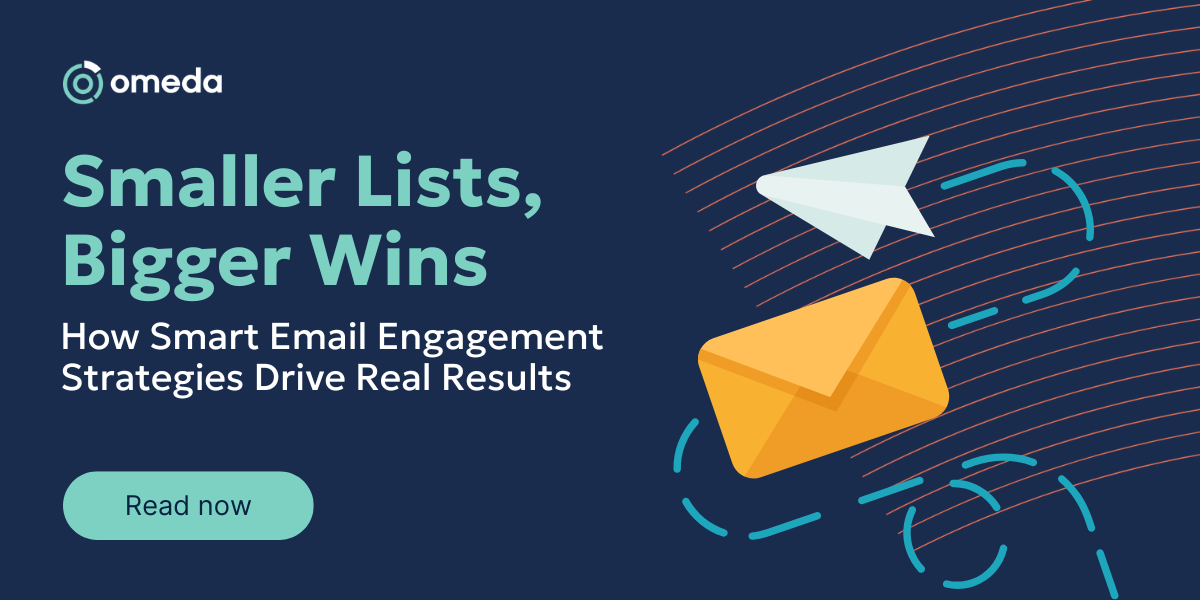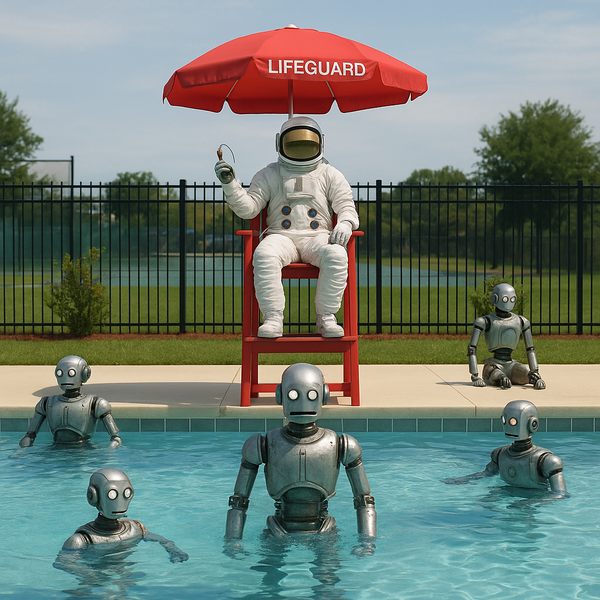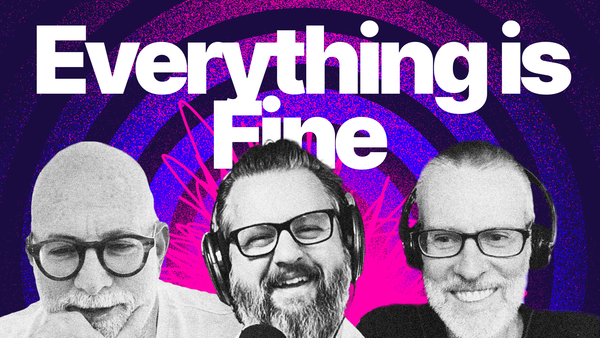The easy way vs the hard way
The battle for free speech
The Rebooting partnered with Beehiiv on a private dinner last night in New York City that brought together a great group of publishing audience development and product executives to discuss the post-search and post-social landscape. The dinner conversation surfaced the central challenge of publishers balancing direct audience growth and retention through newsletters, apps, events, and SMS while experimenting with innovation in personalization, creator partnerships, and AI-driven products against the backdrop of a shifting distribution landscape.
We hold these gatherings throughout the year, focused on specific media business areas. Leave your information here if you want to be considered for invitations.
Today:
- The free speech battle test
- AI doomers are back
- The logic of Puckmail, the curious rise of TBPN, and Gannett’s AI search tool

Why smaller lists win

Bigger lists don’t always mean better results. In fact, bloated databases can hurt deliverability, dilute engagement, and hide your most valuable readers. Smaller Lists, Bigger Wins shares how two publishers strategically cut their lists — and saw higher engagement, stronger advertiser value, and better ROI. You’ll learn the steps they took, how they got internal buy-in, and how you can make the shift without losing revenue. If you’re ready to rethink list strategy and focus on the audience that truly moves the needle, this guide is your roadmap.
The easy way or the hard way
The inevitable has come to pass: Trump is weaponizing governmental institutions to squelch free speech. His neutering of Congress, along with attacks on higher education, the Federal Reserve, the military, the intelligence agencies, the courts and more have made this standoff inevitable. And it will continue.
The attorney general of the United States earlier this week said that free speech does not include “hate speech,” and the president is endorsing this view while filing a $15 billion lawsuit against The New York Times for, among other specious claims, giving too much credit to Mark Burnett for the success of the reality TV show the president starred in. Paramount caved to Trump to settle another specious lawsuit in order to get its merger deal through regulatory scrutiny. And now, Trump’s FCC has muscled ABC, which already paid Trump $15 million in a specious settlement, into taking Jimmy Kimmel off the air over a joke.
This is bad no matter how you try to parse what Kimmel said. Everybody should know better. Don’t take it from me: Listen to the always level-headed Tucker.
Trump has been heading in this direction for a while. As a candidate in 2016, he vowed to “open up” libel laws. He will take aim at New York Times vs Sullivan, which established the "actual malice” standard that’s safeguarded the press from being muscled with endless defamation lawsuits by the rich and powerful. The delegitimization of the press is another power grab. The murder of Charlie Kirk was pretext.
“Frankly, when you see stuff like this — I mean, we can do this the easy way or the hard way,” said Brendan Carr, the head of the FCC, doing his best to imitate a mafia thug or New York City real estate broker on Benny Johnson’s podcast.
The same is true for media companies. They’ve found themselves exposed with their myriad business interests to government pressure. Bob Iger, CEO of ABC parent Disney, chose the easy way. Late-night TV is a dying genre. CBS axing Colbert was understandable on business reasons, if unseemly. Grouse all you want about The New York Times, you can at least be sure it will take the hard way.
The upside is this could galvanize these companies in the bigger purpose of free speech. This is a tough business that will get tougher. And Trump’s ham-handed attacks are a reminder of a bigger purpose. I still believe that the American people are for the most part reasonable and hate being told what to do, as they always have historically.
The fever swamp sector of the Information Space is in a pickle. This clear case of government overreach into a fundamental American right, one these very people spent an awful lot of time obsessed about, will separate the serious people from the carnival barkers. The problem with principles like free speech is they require you to sign up for defending the rights of those you disagree with wholeheartedly. You end up having to line up with 2 Live Crew’s rights to sing “Me So Horny.” That’s how it goes.
There’s an irony in how all this is done in memory of Charlie Kirk, who made one of his core issues free expression and died wearing a shirt with FREEDOM on the chest.
AI extremes
We’ve had a long run of the AI Maximalists who are ready to plow ahead and make increasingly outlandish predictions of AI eliminating the need for doctors even as it cannot parse a spreadsheet. The trillions poured into AI development are more the product of science fiction than spreadsheets. I suppose you could pencil out the sum value of human labor and hazard a guess that if AI can just replace 25% of it with software.
The inevitable trough of disillusionment is being joined by a comeback of the AI doomers, who are a fork of the AI Maximalists. Think of the Doomers as being in Berkeley and the Maximalists in Atherton/Palo Alto. Both are marketing AI in the extremes and, consciously or not, helping each other gain attention. The Doomers are led by Eliezer Yudkowsky and Nate Soares, who have skipped subtlety entirely in their new book: If Anyone Builds It, Everyone Dies. The title alone does all the work. One shot at creating superintelligence, and if we miss, civilization collapses. No muddling through, no partial credit — just binary doom.
I listened to multiple hours of podcast conversations with the authors. I came away with a similar feeling of listening to Tucker Carlson: Some sensible points stretched to the point of insanity, but also very merchandisable in the Information Space. It’s difficult to take their predictions of the end of humanity seriously when I had just admonished ChatGPT for being unable to parse a simple spreadsheet of research report downloaders to identify the publishers in a spreadsheet. I’m going to have to see this cognitive toaster know the Los Angeles Times is a publisher before I’m scared of it.
Fear is the point, however. You see this with the AI Maximalists who conflate any oversight of AI’s development to basically holding back cures for cancer and handing America over to the Chinese Communist Party. I’m always struck by how disingenuous these people are, but I understand everyone has a role to play and the incentives of the Information Space are more important than intellectual integrity because there is no price to be paid for faux hyperventilating.
This is all a reminder that there will always be a market for packaged media that does not try to compete in the Information Space. The effort to choke off AI engines from publisher content is a necessary attempt to regain leverage under the garbage-in-garbage-out theory. There will be publishers that opt out of the AI world for the most part to provide craft, touch-grass alternatives to the synthetic fantasy land that is becoming a larger part of the Information Space.
We'll discuss free speech battles and AI maximalists in this week's episode of People vs Algorithms, which publishes every Friday morning. Get it on various podcast platforms. Other topics:
Puck’s added “girth.” Anonymous Banker counsels me to avoid “micromedia” as a descriptor. He sees the all-stock deal to acquire Air Mail as a play for “girth”: bigger top of the funnel with 500,000 emails, more paid subscribers, and a new ad category of luxury advertisers to get around the awkward fit of those BP adds on the Grill Room. Of course, that depends on whether the luxury advertisers will stick around if Graydon Carter's role diminishes. It will also gain a commerce operation and a couple twee retail outlets, including one in the West Village that is due north of Puck’s “South Tribeca” headquarters in FiDi. It’s also a sign that there was not much of a market for Air Mail, which has been shopped for a year with the requisite fantasy land valuation leaks.
TBPN and media magic. Optics matter in media. TBPN does not have a big audience. I’ve swung by its livestreams with a dozen others. It reliably churns out clips that bounce around. And yet it is seemingly everywhere. It has established itself as something of the “hometown newspaper” of the tech industry, a cozy place for venture capitalists and startup operators to shoot the shit with hosts who are tech supporters. Yesterday, Mark Zuckerberg (along with other Meta execs) joined the show, which The Free Press called "the most influential talk show you've never heard of," in a livestream from Meta's promotional event for its latest iteration of face computers. The property is well positioned and well executed. It's a testament to how influence has decoupled from reach.
Gannett’s AI tool. At the Wired AI Power Summit, Gannett CEO Mike Reed trumpeted the release on Monday of DeeperDives, a new generative AI search tool created in partnership with Taboola. The toolbar follows you around USA Today, inviting you to get generative AI-created answers on news topics. The twist is the answers are created only with Gannett content. This is a sensible, if narrow approach, since it is arbitrary to think the only “right” answers will come from one media company. I’m not convinced that kind of brand loyalty exists for most news publishers anymore. It also will likely run counter to user behavior as people simply associate gen AI answers with ChatGPT, Gemini, Claude, etc.
Thanks for reading. Send me a note with feedback by hitting reply.
Interested in sponsorship? See how we work with partners.



